 Petzlover
Petzlover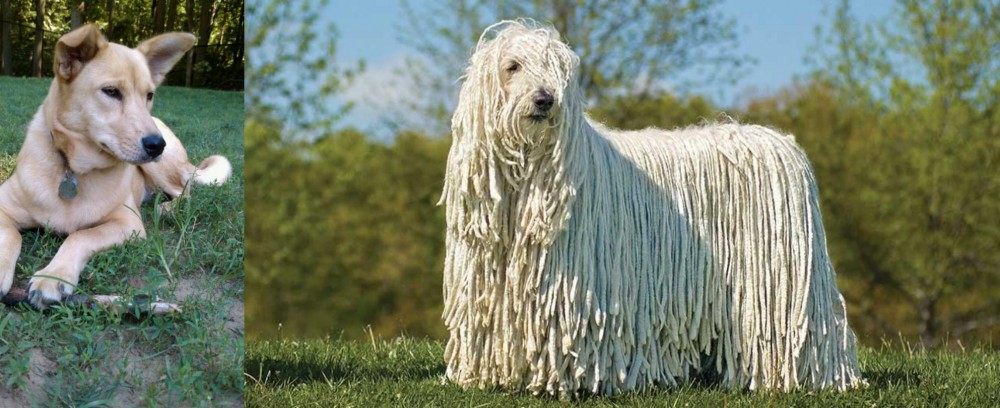 Carolina Dog is originated from United States but Komondor is originated from Hungary. Carolina Dog may grow 15 cm / 5 inches shorter than Komondor. Carolina Dog may weigh 40 kg / 88 pounds lesser than Komondor. Carolina Dog may live 3 years more than Komondor. Carolina Dog may have less litter size than Komondor. Carolina Dog requires Moderate Maintenance. But Komondor requires High Maintenance
Carolina Dog is originated from United States but Komondor is originated from Hungary. Carolina Dog may grow 15 cm / 5 inches shorter than Komondor. Carolina Dog may weigh 40 kg / 88 pounds lesser than Komondor. Carolina Dog may live 3 years more than Komondor. Carolina Dog may have less litter size than Komondor. Carolina Dog requires Moderate Maintenance. But Komondor requires High Maintenance
 The Carolina dog comes from wild dogs that used to run with the Paleo-Indians of North America, and today they can still be found in their wild state near the Georgia-South Carolina border.
The Carolina dog comes from wild dogs that used to run with the Paleo-Indians of North America, and today they can still be found in their wild state near the Georgia-South Carolina border.
Many scientists believe that the dog was first domesticated from the wolf thousands and thousands of years ago. Today there aren’t many records on the Carolina Dog’s history and it isn’t sure how long they lived their feral lifestyle in the American South, but it seems as though it was for hundreds of years.
You could say that the modern history of the Carolina Dog started in the 1980s. Dr. Pam Brisbin found a puppy at a dump site which looked like the Australian Dingo. Dr Brisbin and other scientists concluded that the Carolina Dog was a remnant of primitive dogs. Since those times the Carolina Dog has adapted well to being a domesticated pet.
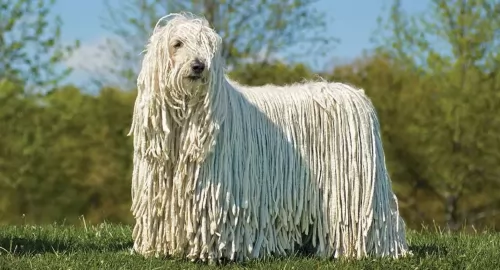 Looking like a giant mop, and sometimes being referred to as 'mop dogs' the Komondor, known also as the Hungarian sheepdog, hails from Hungary.
Looking like a giant mop, and sometimes being referred to as 'mop dogs' the Komondor, known also as the Hungarian sheepdog, hails from Hungary.
The dog was brought to Europe centuries ago so he is a well established breed. It has been declared as one of the country's national treasures.
He is a dog related to many other dogs such as the Pulim the Ovcharka, the Bearded Collie, Old English Sheepdog and others.
 The Carolina dog is part of the Sighthounds Group and looks a bit like a Dingo, German Shepherd and Wolf mix. He has fairly long, pointed erect ears, a sharp wolf-like snout and a long tail that curves when raised.
The Carolina dog is part of the Sighthounds Group and looks a bit like a Dingo, German Shepherd and Wolf mix. He has fairly long, pointed erect ears, a sharp wolf-like snout and a long tail that curves when raised.
The Carolina dog has been re-discovered however and when trained and socialized, they make splendid pets. It’s a medium sized dog standing at 45–61cm and weighing from 15–20kg. He is slender, muscular and athletic with a coat that is short and fairly smooth. Colors for the Carolina dog vary and he can be fawn colored, a gingerish color, black and tan and can have some white areas on the paws, chest, muzzle and tail.
The Carolina Dog has been a wild dog, belonging to a pack and while he isn’t aggressive, he is nervous and aloof around strangers. Good training and socialization provides him with the skills to get along well with his human family as well as with children and other pets in the home.
Because this dog has always been wild, they tend to maintain some of their wild, independent nature and they can be difficult to train and it requires firmness and patience with him, but he is an intelligent breed.
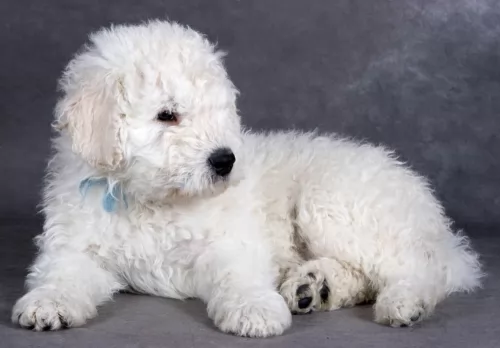 Known for his unique long corded, singular white coat, the Komondor, a molosser dog, is large. Females start at 64cm in height and both males and females can reach up to 76cm in height.
Known for his unique long corded, singular white coat, the Komondor, a molosser dog, is large. Females start at 64cm in height and both males and females can reach up to 76cm in height.
This unusual coat of theirs is wavy and actually forms cords or dreadlocks as the dog matures. You can't easily see the dog's face because of all the hair.You also can't see the tail easily, in fact you might think he hasn't got a tail as it is obscured by the hair. The tail is medium length and held low.
He has a large head, dark brown eyes, and floppy ears. The coat is certainly going to require grooming even though the dog doesn't shed much. His body is robust and well muscled with the body being slightly longer than the height of the dog.
The Komondor has been a dog used for guarding livestock, and while his character is calm and balanced, when the livestock is threatened, he can show another side – more aggressive – as he defends his flock. He makes an excellent watchdog.
He is an affectionate dog with his human family, being a gentle playmate of children. He is slightly reserved and wary of strangers, and is willing to guard and protect his human family from them.
He is also good with other family pets. When you look at him you might think of him as not being very energetic, but he is an athletic dog, fast and powerful. Because of his size and speed, it is best to have him trained and socialized as he can be obstinate. Training him makes him obedient.
 The Carolina Dog is a medium-sized dog which has managed to survive well in the wild environment. It is this life in the wilds which has made the dog to be shy and aloof around strangers.
The Carolina Dog is a medium-sized dog which has managed to survive well in the wild environment. It is this life in the wilds which has made the dog to be shy and aloof around strangers.
They are skilled and intelligent and when domesticated they make extraordinary pets even though he isn’t an overly affectionate dog. It is why he requires early socialization so that he doesn’t grow up shunning humans.
With training however, the Carolina Dog becomes a well-adjusted, loving and social member of the family.
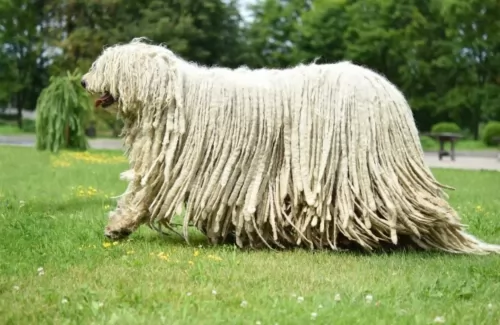 The Komondor is known for his strong guardian characteristics, especially with his human family. He is loving and loyal towards them while being wary of strangers.
The Komondor is known for his strong guardian characteristics, especially with his human family. He is loving and loyal towards them while being wary of strangers.
True, his coat can make people think twice before making this dog a pet, but if you're game and ready to attend to his coat, he can make an excellent family pet. They're fine with other pets too, and he is also an intelligent dog, capable of being easily trained.
He needs a good deal of exercise and can become noisy and destructive without the right amount of stimulation. If you do your part with the Komondor and provide him with a loving, caring home, he will be an awesome pet and guard you with his life.
 The Carolina Dog is a fairly healthy breed. You won’t have to be rushing off to the vet often with him if you look after him well in terms of a good diet, a food amount of exercise and plenty of love and attention. In fact breeders of the Carolina Dog have noted that they haven’t seen any cases of genetically inheritable diseases with this robust dog.
The Carolina Dog is a fairly healthy breed. You won’t have to be rushing off to the vet often with him if you look after him well in terms of a good diet, a food amount of exercise and plenty of love and attention. In fact breeders of the Carolina Dog have noted that they haven’t seen any cases of genetically inheritable diseases with this robust dog.
However with all dogs, no matter how healthy they are, there can be problems. Problems common to domestic dogs can include skeletal and visual problems. Many dog owners have their pets tested to identify some of the potential health defects that some dogs are prone to. This can include hip dysplasia, cataracts, cancer and PRA or Progressive Retinal Atrophy.
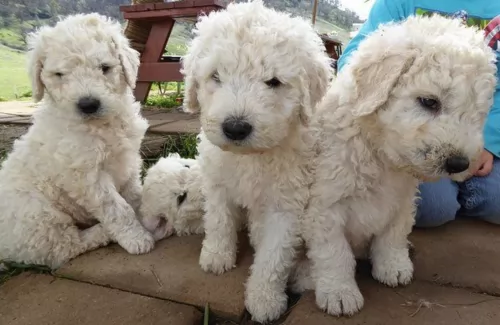 The Komondor is a healthy dog breed who can live to be 10, 11 or 12 years if you look after him well. There aren't any known genetic disorders prominent with the dog, but it pays to know about some of those that could strike -
The Komondor is a healthy dog breed who can live to be 10, 11 or 12 years if you look after him well. There aren't any known genetic disorders prominent with the dog, but it pays to know about some of those that could strike -
This is an irritating eye problem where the eyelash rubs up against the eyes.The result can be scratching of the cornea and eye infections. It is an eye problem which can be corrected with surgery.
Hip dysplasia is a serious genetically inherited disorder and common in large dog breeds. It is caused by a malformation of the hip joint. It can cause problems for the dog, weakening the hip and making it incapable of supporting the weight of the dog.
It also leads to pain for the dog, difficulty with moving and even total lameness. Weight, size of dog, age and genetics are all factors which can increase the dog's likelihood of developing hip dysplasia.
Whimpering, lethargy and refusing to put weight on the leg are common signs of hip dysplasia and your vet will go ahead with ways to relieve the pain and symptoms of your Komondor.
 The Carolina Dog is a seasonal shedder and the shortish coat will simply require a thorough brushing twice a week to keep him in tip top condition.
The Carolina Dog is a seasonal shedder and the shortish coat will simply require a thorough brushing twice a week to keep him in tip top condition.
This dog, with his upright ears, isn’t prone to ear infections as other breeds, but nonetheless as part of his grooming routine, its a good idea to to check his ears inside for wax build-up and dirt. Certainly his teeth should be brushed 2 or 3 times a week with special dog toothbrush and toothpaste. This keeps the gums and teeth healthy and also avoids other diseases that come about because of dental disease.
Whether you feed your Carolina Dog once or twice a day, you want to ensure the very best quality diet to avoid skin problems and illness. You also have to ensure your dog has 24/7 access to fresh, cool drinking water to help him with digesting his food.
There are some excellent commercially manufactured dog foods on the market which have been manufactured for certain stages of your dogs life. Add in some rice, vegetables and meat from time to time and every now and again you can give him some raw meat too.
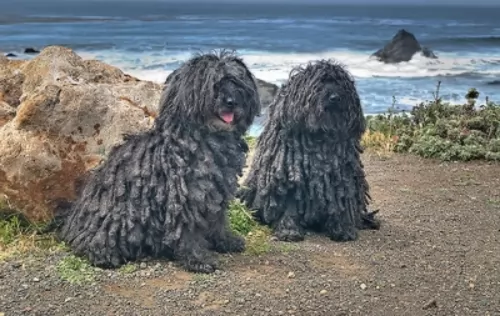 The Komondor is most certainly not a low maintenance dog with that extraordinary coat.Before the dog turns 1, the coat begins to form its cords. These cords can become discolored and matted, In fact the cords will need to be separated to keep the dog clean and free of matted hair.
The Komondor is most certainly not a low maintenance dog with that extraordinary coat.Before the dog turns 1, the coat begins to form its cords. These cords can become discolored and matted, In fact the cords will need to be separated to keep the dog clean and free of matted hair.
For those who keep the dog as a pet and who don't want him to be a show dog, he can be trimmed, otherwise the coat and its maintenance could turn out to be a real issue.
Of course once the distinctive coat has been sheared, he loses that typical and recognizable Komondor look.
Check his ears on a regular basis for wax- and dirt buildup so as to prevent ear infection.
Teeth need to be checked regularly to prevent tartar buildup and if you don't have the time or the knowledge to keep his teeth clean and maintained, take him to the vet as the teeth-treatments they do there will promote healthy teeth and gums.